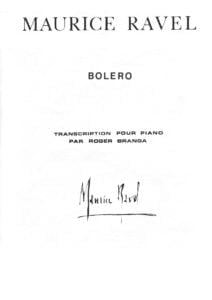Browse in the Library:
Search Posts by Categories:
Collard plays Ravel – Pavane pour une infante défunte with sheet music

Collard
Browse in the Library:
Jean-Philippe Collard (born 27 January 1948) is a French pianist known for his interpretations of the works of Gabriel Fauré and Camille Saint-Saëns.
Collard was born on 27 January 1948 in Mareuil-sur-Ay, Marne, into a musical family. He started playing the piano at age five. In 1960 he traveled to Berlin having been sent by the Jeunesses musicales de France to compete in the International Competition for young pianists. At 16 he won First Prize at the Paris Conservatory of Music. He is also a winner of the Gabriel Fauré Award. In addition, Collard has won a First Prize from the Marguerite Long-Jacques Thibaud Competition, the Albert Roussel Award and the Cziffra International Competition.
In 1973 he played his recital debut in Paris at the Théâtre des Champs-Élysées. Critics in Paris were very enthusiastic. “He has all the right qualities which make him a musician of the highest order; his technique, his sensibility are like the flower of virtuosity” — Le Figaro, February 1973.
He is considered one of the greatest exponents of the French school. Collard made his American debut in 1973 with the San Francisco Symphony Orchestra, conducted by Seiji Ozawa. The performance was praised by the San Francisco Chronicle.
A prolific recording artist with more than thirty titles to his credit, Collard’s discography includes Rachmaninov‘s Études-Tableaux and the Brahms Hungarian Dances (with pianist Michel Beroff), both named Stereo Review’s Record of the Year in their respective years; the Ravel concerti with Lorin Maazel and the Orchestre National de France, cited by Gramophone magazine as Best Concerto Recording; and the Chausson Concert, Op. 21 (with Augustin Dumay and the Muir String Quartet) which won the Grand Prix du Disque.
He has recorded all five Saint-Saëns piano concerti with André Previn and the Royal Philharmonic Orchestra, and the first recordings of Mozart‘s arrangements of the six French melodies with baritone José van Dam. Other recordings include a disc of Chopin‘s Ballades and his third sonata, and a Liszt recital disc including the B minor sonata.
He is the Artistic Director of the Flâneries musicales de Reims.
Jean-Philippe Collard belongs to that category of artists who move through space in the same way as they play: the measured gestures brush past the lights until he sits down in front of the instrument. The pianist has come to listen to those who have come to hear him. What he proposes is a dialogue without words. Just through the eyes and then through sound. An infinity of sounds.
This very special complicity conceals all the preparatory work that comes before the concert: the need to forget one’s nervousness (how long afternoons are before going on stage!), to dominate an impatient body, to channel one’s courage, the self-control of the final moments before the leap into the void, it all depends. It is necessary, he says, ‘to be sucked into the music, to be calm enough to find your way back to spontaneity, and to captivate the audience’.
The urge to convey and reveal the beauty of music exceeds the nature of a mere passion: it is a matter of vital necessity, for which one must resolve to share one’s own emotions, without the desire to conquer those of others in return. An offering, now of immense proportions after hundreds of concerts and more than sixty recordings.
‘You have to strike straight at the heart and not over-intellectualise works you’ve frequented for years’, he says. Those works constitute a fabulous harvest, the fruits of Romanticism, from Chopin and Schumann right up to Rachmaninoff, made still more beautiful by two centuries of French music.
All Jean-Philippe Collard’s sound worlds are impregnated with colour: the ‘sensation produced on the organ of sight by light variously reflected by bodies’, says the Littré dictionary, with an epicurean perception unusual in such a volume yet intensely familiar to a pianist who, precisely, declares that he is ‘hungry for colours’. But not just any colours. A gourmet of pigments, the artist knows what nuance means in every context, when sonic landscapes with a measured temperament resonate in the iridescence of arpeggios and the long finish of chords.
When he recalls his apprenticeship with Pierre Sancan, his friendship with Vladimir Horowitz and his encounters all over the world with the elite of conductors and the foremost orchestras, Jean-Philippe Collard knows that he can tell the public everything. So he has paid tribute to the gods of colour, his composers.
« Jean-Philippe Collard is an outwardly quiet performer who does not go in for heart-on-the-sleeve emoting. Instead, he develops his interpretations thoughtfully, establishing a mood or building a dramatic climax almost without one’s being aware of what is happening. As a result, the music seems to live a life of its own, almost independent of the pianist’s ministrations, which is as it should be ».
(The New York Times)
